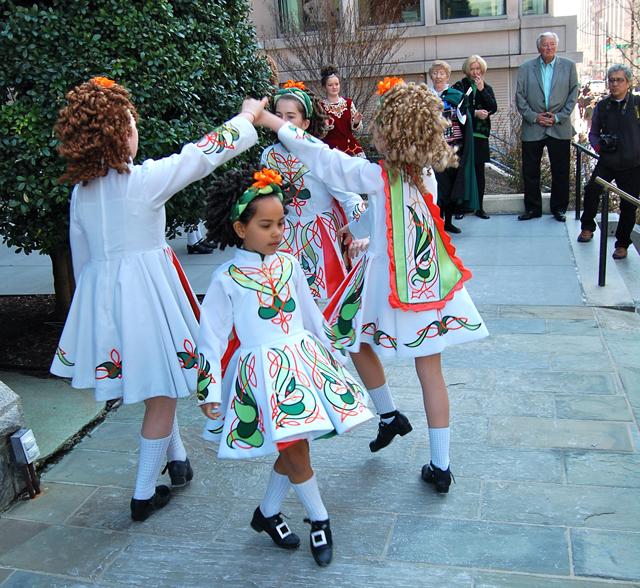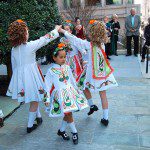Irish Ayes for Old Friends and the Auld Sod
By • March 19, 2012 0 1175

“I am of Ireland
And the Holy Land of Ireland
And time runs on, cried she,
‘Come out of charity
Come Dance With Me in Ireland.’ ”
— W.B. Yeats
I am not Irish and not of Ireland.
But, aye, often I have wished to be. Now, on St. Patrick’s Day, thousands, maybe millions embrace the same wish as if they had kissed the Blarney Stone on a damp day some time ago. They wear green, drink green beer, quaff the quaffables, sing and dance, wear green hats, try to speak Gaelic, listen to the grand Irish music and perhaps stand on a floor in two inches of Guinness and tears. Perhaps not. Most parades have already gone by. The music will linger if you’ve heard it.
Yes, the Irish in America have left their imprint. They brought their famine tales, destitution and memories. They came in droves in the wake of the Great Famine of the early mid-19th Century. They came to where stores were littered with signs that read, “Irish need not apply.” They were drawn in political cartoons as pipe-smoking monkeys.
They brought their music, their smitten-with-words poetry, their poets and playwrights, their fiddle players and their red-headed sages and lasses. They left their troubles behind in Ireland where they still persist here and there, as mysterious a tragedy as ever existed. They became cops, firemen, nannies — and, soon enough, politicians — and bartenders, priests and nuns, except for the Ulster folks.
They gave us Shaw, Yeats, Wilde, Behan, Synge and the great Irish place names. Eugene O’Neill who is enjoying a festival of his works at Arena Stage and throughout was as wildly Irish as you can be. Just check out that crazy family saga, “Long Day’s Journey Into Night,” or “A Touch of The Poet.” O’Neill knew that the Irish also quadrupled the number of bars in America, and he wrote the ultimate bar play, “The Iceman Cometh,” which I trust alcoholics living day to day would avoid. The second best bar play was written by an Armenian, and it was called “The Time of Your Life.” If Eastern Europeans were Irish, they would be called Armenians.
Myself, I emigrated from Germany knee high to nothing at ten years old from the most Irish place in Germany, which would be Bavaria. Bavaria is as Catholic as Ireland, as beer-soaked as Ireland and as Bohemian as Ireland, and it has its grand stock of peasant tales and superstitions and music And the food is better. Maybe that explains the affinity.
John Ford was Irish —the great director of westerns and Americana movies — and also directed “The Quiet Man,” which is Ireland as a dream of Ireland, a technicolor film where the greens and reds were so green and so red that they looked like paint. It had a matchmaker played by Barry Fitzgerald, who drank too much, a village where the local Catholic protected its Anglican priest by pretending to be Protestant. It had John Wayne as a retired pugilist. It had Maureen O’Hara, whose hair defined the term “redhead.”
O’Hara came from the Abbey Theatre still alive and strong in Dublin. Irish writers will always be among us. Witness Seamus Heaney, the great Irish poet, and the new breed of Irish playwrights, whose work is both surreal, crazy and modern. There’s a lad named McDonough who is particularly good. Look out for a production of his “The Seafarer” soon, produced by Robert McNamara, the artistic director of Scena Theatre who is as solemnly Irish as they come. The play is about three men who play poker with the devil, and you know what the stakes are. The devil does all right until he starts taking tastes of the homegrown brew in the house. Plays are about words, and, boy, do the Irish love to talk and sing.
I believe in my heart that the Irish invented poetry and the job title of bartender. How else would so many who found work found it as a bartender? I knew a few in Washington in my time in places like the Dubliner, Nanny O’Briens, Kelly’s Irish Times, the Four Provinces, Matt Kane’s, Ellen’s and from what I hear tell, there’s a whole new generation of publicans and pubs. In those places and among those gentlemen — along with the ladies — I found such surely old-fashioned qualities as trust and loyalty, fierce kindness and grand thoughts and talk. There is something to be said for the drink, were it not for the fact that you can’t remember what it was that was said. A toast to the Kelly’s Michael and Hugh, Mr. Coleman at the Dubliner and Obie O’Brien. Some have gone, none forgotten.
And always, the sound of the fiddle, the Celtic drums, the rebel songs, and sad songs about the troubles and old Irish moms mourning their sons. There is dancing and, of course, as luck would have it “Danny Boy,” a song impossible to sing properly and which almost everyone thinks they can sing. I remember a member of the Irish embassy, an older gentleman in a bow tie and sports jacket, singing it loud and clear in the kitchen at 3 a.m. at Kelly’s Irish Times a long time ago.
They held “Reel Around the Shamrock” with Eileen Evers and Immigrant Soul at the Music Center at Strathmore this Thursday along with the Culkin School of Traditional Irish Dance with Brendan Mulvihill and Billy McComiskey. Mulvihill, a national fiddle champion in Ireland, and McComiskey were part of the Irish Tradition, one of the most popular Irish bands on the East Coast. Brendan could break your heart when he played the fiddle. And I can recall that he had an Afro load of Irish hair and how the Tradition’s music rousted the Wild Rover in all of us.
More than that, Paddy Maloney and the Chieftains are celebrating a 50th anniversary at the Kennedy Center this Friday night, March 16. Things don’t get more Irish than that.
- Students from the O’Neill-James School of Irish Dancing in Arlington perform in front of St. Patrick’s Church on 10th Street, N.W., after last year’s St. Patrick’s Day noontime mass. | Robert Devaney
- Robert Devaney



